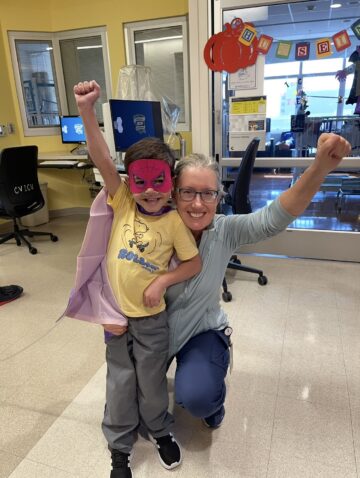Sofia Rodriguez and CHOC cardiologist Dr. Anthony McCanta are making medical history. The petite 12-year-old recently became the smallest and youngest patient to receive the Micra® Transcatheter Pacing System (TPS). The innovative physician, who specializes in pediatric electrophysiology, joins an elite group of doctors in the world who have implanted the device, and is likely the first to do so in a child.
About the size of a vitamin, Micra TPS, which was approved by the Food and Drug Administration last year, provides the most advanced pacing technology at one-tenth the size of a traditional pacemaker. And unlike traditional pacemakers, the device does not have cardiac leads, which are the wires that carry electricity from the pacemaker to the heart and the other way around. This activity occurs between 100,000 to 200,000 times in most children, eventually putting a strain on the leads. The leads can then break or stop working properly, requiring a new device to be implanted.
In addition to being leadless, the Micra TPS is small enough to be delivered through a catheter and implanted directly into the heart instead of a surgical “pocket” under the skin. This offers patients a safe alternative to conventional pacemakers without the complications associated with leads — all while being cosmetically invisible.
Sofia’s story
Diagnosed shortly after birth with a particularly complex form of tetralogy of fallot, a rare and serious heart condition, Sofia had her first pediatric open-heart surgery before turning 1 month old and a second, to implant a traditional pacemaker, when she was 6 months old. Abdominal surgery followed, as did a diagnosis of DiGeorge syndrome, a chromosomal disorder that affects the development of several body systems.
Sofia tackled each health challenge with a fierce determination to survive and, more than that, to enjoy her childhood. Her parents and the team at the CHOC Heart Institute supported her every step of the way, equally committed to her quality of life.
When the pre-teen needed a new pacing system (the cardiac leads from the first device had broken), Dr. McCanta advocated for the Micra TPS. He knew the benefits it would bring to Sofia, and other CHOC patients.
“The immediate benefit to Sofia is that she does not have another scar on her upper chest. The long-term benefit is she has no cardiac lead in her vein that could break, become infected or cause a blood clot,” explains Dr. McCanta. “When you consider the course of her entire life, the benefit of reducing complications of pacing is almost immeasurable.”
Sofia’s parents are proud of the part she played in the medical milestone. “She’s always been special, and here’s just one more thing that demonstrates how special she truly is,” says Sofia’s dad, Edgar. “We are thankful for people like Dr. McCanta and so impressed with the new technology. We feel truly blessed.”

When she’s not on her computer, Sofia loves watching videos and listening to Latin music. She’s outgoing with lots of friends and a bright future ahead of her.
Get more expert health advice delivered to your inbox monthly by subscribing to the KidsHealth newsletter here.

Learn more about CHOC’s Heart Institute
CHOC Hospital was named one of the nation’s best children’s hospitals by U.S. News & World Report in its 2024-25 Best Children’s Hospitals rankings and ranked in the cardiology and heart surgery specialties.





